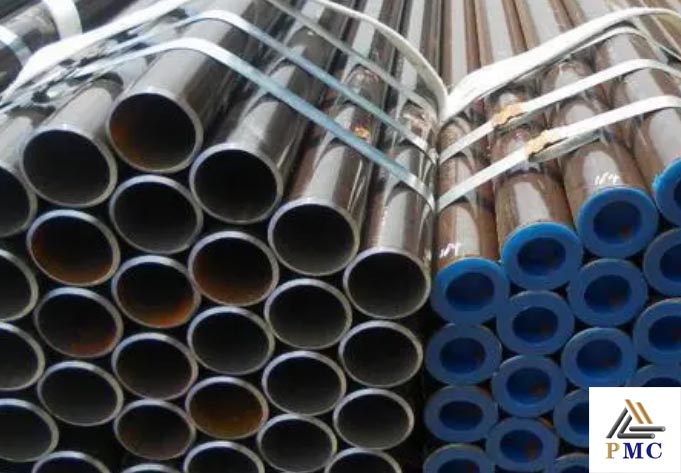
Influence of Common Chemical Elements on Properties of Carbon Steel Pipes
Date:2023-07-21 keywords: carbon steel chemical elements, carbon steel pipe
Carbon steel is the basic material used early and in large quantities in modern industry. While trying to increase the output of low-alloy high-strength steel and alloy steel, various industrial countries in the world also pay great attention to improving the quality of carbon steel and expanding the variety and scope of use. At present, the production of carbon steel accounts for about 80% of the total steel production in various countries. It is not only widely used in construction, bridges, railways, vehicles, ships and various machinery manufacturing industries, but also in the modern petrochemical industry and marine development. Carbon steel pipe & tube (cs pipe) plays an important role in my country's steel pipe industry.
The influence of common chemical elements on the properties of carbon steel pipes:
1. Carbon
The increase of carbon content makes the strength and hardness of carbon steel increase, and the plasticity, toughness and welding performance decrease. Generally, when the carbon content is greater than 0.25%, the weldability of carbon steel begins to deteriorate.
2. Silicon
The solid solution of silicon in ferrite and austenite increases their hardness and strength. If the silicon content exceeds 3%, the plasticity, toughness, ductility and weldability of the steel will be significantly reduced, and it will easily lead to cold and brittleness.
3. Sulfur, oxygen
Sulfur and oxygen, as impurity elements, often exist in carbon steel in the form of non-metallic compounds (such as FeS, FeO), forming non-metallic impurities, which will lead to the deterioration of the performance of carbon steel, especially the presence of sulfur, which will cause hot embrittlement of steel.
4. Phosphorus, arsenic, antimony
Phosphorus, arsenic, and antimony are impurity elements. They have a certain effect on improving the tensile strength of carbon steel, but at the same time, they all increase the brittleness of steel, especially low temperature brittleness. (Because phosphorus exists in ferrite in the form of solid solution, it affects the lattice deformation of ferrite, making carbon steel brittle at room temperature. This phenomenon is called cold and brittle). Both phosphorus and arsenic are harmful elements that cause serious segregation of carbon steel. Phosphorus is detrimental to the weldability of steel, it can increase the susceptibility to weld cracking.
5. Tungsten
When the tungsten content in the steel is high, it has the effect of secondary hardening, red hardness, and increased wear resistance. The influence of tungsten on the hardenability, tempering stability and mechanical properties of steel is similar to that of molybdenum, but its effect is not as significant as that of molybdenum in terms of mass. Tungsten improves the creep resistance and hot strength of steel at high temperature, and the effect is better when used in combination with molybdenum.
Carbon steel, also known as carbon steel or plain carbon steel, refers to an iron-carbon alloy with a carbon content (Wc mass fraction) less than 1.35%. Carbon steel generally contains a small amount of silicon, manganese, sulfur and phosphorus in addition to carbon.

The influence of common chemical elements on the properties of carbon steel pipes:
1. Carbon
The increase of carbon content makes the strength and hardness of carbon steel increase, and the plasticity, toughness and welding performance decrease. Generally, when the carbon content is greater than 0.25%, the weldability of carbon steel begins to deteriorate.
2. Silicon
The solid solution of silicon in ferrite and austenite increases their hardness and strength. If the silicon content exceeds 3%, the plasticity, toughness, ductility and weldability of the steel will be significantly reduced, and it will easily lead to cold and brittleness.
3. Sulfur, oxygen
Sulfur and oxygen, as impurity elements, often exist in carbon steel in the form of non-metallic compounds (such as FeS, FeO), forming non-metallic impurities, which will lead to the deterioration of the performance of carbon steel, especially the presence of sulfur, which will cause hot embrittlement of steel.
4. Phosphorus, arsenic, antimony
Phosphorus, arsenic, and antimony are impurity elements. They have a certain effect on improving the tensile strength of carbon steel, but at the same time, they all increase the brittleness of steel, especially low temperature brittleness. (Because phosphorus exists in ferrite in the form of solid solution, it affects the lattice deformation of ferrite, making carbon steel brittle at room temperature. This phenomenon is called cold and brittle). Both phosphorus and arsenic are harmful elements that cause serious segregation of carbon steel. Phosphorus is detrimental to the weldability of steel, it can increase the susceptibility to weld cracking.
5. Tungsten
When the tungsten content in the steel is high, it has the effect of secondary hardening, red hardness, and increased wear resistance. The influence of tungsten on the hardenability, tempering stability and mechanical properties of steel is similar to that of molybdenum, but its effect is not as significant as that of molybdenum in terms of mass. Tungsten improves the creep resistance and hot strength of steel at high temperature, and the effect is better when used in combination with molybdenum.
©2017 Permanent Steel Manufacturing Co.,Ltd https://www.permanentsteel.com All Rights Reserved.
Terms of Sale|Privacy Policy


